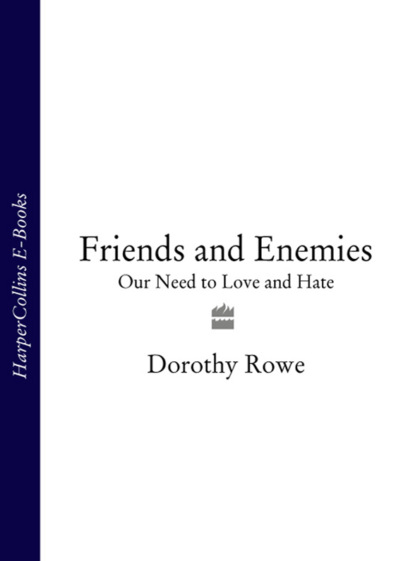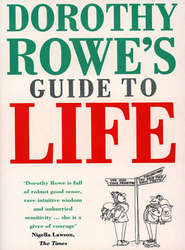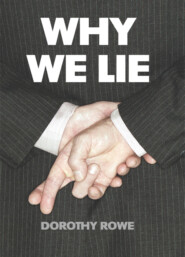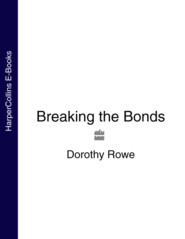По всем вопросам обращайтесь на: info@litportal.ru
(©) 2003-2024.
✖
Friends and Enemies: Our Need to Love and Hate
Автор
Год написания книги
2018
Настройки чтения
Размер шрифта
Высота строк
Поля
‘Do you feel they aren’t interested or do they feel they shouldn’t ask questions?’
‘I think they were brought up not to ask questions, to keep at a distance. I think maybe they could be much better, much closer to foreigners, but they don’t know how to approach. Maybe it’s better for me to think that. I don’t want to think they don’t want to approach.’
I talked about my experience as an Australian in England. I said, ‘Sometimes people don’t know how to frame a question because they don’t know enough about your background to frame a sensible question. I’ve met hundreds of English people – they know I’m Australian as soon as I speak – and the only thing they know about Australia is the weather. They say, “Don’t you miss the wonderful weather?” But they don’t ask other questions unless they’ve been to Australia, or they’ve got a relative there, when they’ll say, “Perhaps you’ve met my relative. She lives in New Zealand.” New Zealand is fifteen hundred miles away from Sydney.’
Diyana recognized what I was describing. ‘When I’m asked where I’m from – because after the first sentence they discover I’m not from here – and I say, “I’m from Europe.” “Which part of Europe?” they’ll say. “Is it Poland?” And I say, “Not Poland. It’s Bosnia, the former Yugoslavia.” And they say, “There was a terrible war down there. Is it still on?” or something like that. And I can’t go on with the conversation. It’s finished before it’s started. I just answer sometimes, “Fortunately not. It’s finished now.” But that’s all they can ask you. Not all of them, of course – I don’t want to insult them.’
After a year or so in London Diyana had met a few people who had a good knowledge of what went on in Bosnia, and who knew that in Bosnia, as in Lebanon, the war might be over but the peace has not been made. She had made friends, but friendship is not easy to maintain when one has little money and every day brings more problems to be overcome.
Indeed friendship is not easy for any of us. This is the consensus of opinion of the many people of whom I asked the question, ‘Is friendship easy?’ Here are some of the answers from the participants of my workshop:
• ‘I don’t think it possible to maintain the sort of relationship which I call friendship with any more than a small number of people because it requires me putting a lot of myself in. So for me the talent is recognizing someone who has the qualities for friendship with me. If you mean a talent for having lots of acquaintances – that’s not where I choose to invest a lot of my energy. That’s not important for me.’
• ‘I can easily strike up a conversation with perfect strangers and form a relationship leading to a friendship. I think if you can communicate and make an opening for the other person to interact you have the makings of a friendship. You then have to learn the skill of maintaining that friendship.’
• ‘I find it difficult to talk to and “read” people.’
• ‘I have a talent for getting along with people and so I think this helps in making friends. But I only have a few close friends.’
• ‘Once someone has become my friend I try always to be there for them and enjoy making a fuss of them on their birthdays. I feel I’ve got a lot of love to give.’
In two other workshops I asked the participants to answer the question: ‘How easy or difficult do you find the whole business of being friends with people?’ using a scale from 1 to 7, where 1 was ‘easy – like breathing – you don’t have to think about it – just natural, no problems’ and 7 ‘difficult – where everything in friendships is difficult, a hassle, a burden, painful, something you can’t manage, something always goes wrong no matter how much you try’. After they had answered this question I asked them if they would have answered the question differently when they were younger and, if so, why.
The people in both these workshops were not strangers to the experience of reflecting on what one does and why. The participants in one workshop were women, each of whom was, in her own way, pursuing enlightenment, while the other workshop was for an international group of high-flying managers who were well aware of the necessity of self-knowledge for a successful career. In both groups the ratings generally hovered about four. Friendship was both hard and easy. However, their comments were more revealing of how hard they found friendship to be.
The comments from the women included:
• ‘I find the initial art of making friends the most difficult. When it’s made it’s the problem of keeping in contact. I find this is often down to me.’
• ‘When I was younger I was much more judgemental of who was right to be a friend. Now I’m more expansive and relaxed.’
• ‘Friendship was easier when I was younger. I was more blithe, less enquiring. I felt life was full of opportunity to make friends. Now it seems more complex. Now I’m friendly but I’m more self-conscious, more inhibited.’
• ‘I never know if people feel the same about friendship and often get it wrong; thinking that people are closer than they are, or thinking that people don’t want to get close to me when they do.’
• ‘Friendship was easier when I was younger. I’ve had hurtful relationships. Now I’m more picky.’
• ‘Being friends is much more difficult than making friends. I am easier in friendships which are not too demanding. Then they become like relatives and I tend to draw back. I can give a lot to friends who don’t ask too much.’
• ‘I found friendships much harder when I was younger and more judgemental. For me the key is acceptance and trying to see the wider picture. If I rejected the people who behaved in a way I didn’t like I would be very lonely.’
• ‘I find as I get older it is harder to meet people and make friends. As people get older they become more inhibited, myself also.’
Here are some of the answers from the men:
• ‘It is difficult to have too many friends but often after the selection process is over I normally go to any length to maintain that friendship even if it means a lot of sacrifice.’
• ‘When I was younger I was less concerned with rejection. It did not register as an issue.’
• ‘I used to be able to find common interests much more easily as a child because children spend a lot of time with each other. They’ve pretty much no barriers. They’re open to each other to begin with. Whereas as an adult, I didn’t have much time or sufficient time to make friends. I must admit I have developed some barriers. Also I have to make commitment and effort to maintain it.’
• ‘I am a very social person who needs to feel needed and accepted. I think that I tried to work hard at developing and maintaining friendships when I was younger.’
• ‘As we grow in age experience catches up with us and we tend to be more suspecting, rather cautious of relationships. A friend in need is a friend indeed. The older you get the more relevant this adage gets.’
• ‘I would have answered a little differently when I was younger. I have forgotten so much about sharing, having become guarded by my experience and somewhat unable to give and receive trust on fresh ground.’
• ‘I grew up in many different places and tended to be careful about not being too friendly with too many people I knew I’d leave behind. The modern marriage makes it difficult for men to maintain friendships. Non-work time must be devoted to the family.’
• ‘As I get older I find it easier to make friends. I believe it’s the result of greater self-confidence and a reduced fear of rejection.’
• ‘When I was younger I was less flexible with family. There has to be certain coordination with my wife. She might not feel the same for a person. Female friends are less likely to happen now. There’s too little time for developing friendships. I stick to (prioritize) a few.’
Only one of the women had rated friendship as completely easy, but she had written, ‘I seem to offer and receive a very durable and rewarding level of friendship, but I do screen people out if I don’t take to them.’ Only one man had rated friendship completely easy, but in the two days I was with the workshop group I saw how he worked ceaselessly to make and to maintain friendships. I could see why when he told me of one of the worst experiences of his life when, in his last year at school, all his friends left and he was completely alone facing what he felt was his annihilation as a person. He now put a great deal of highly skilled work into making sure that that never happened again.
Creating and maintaining friendships and overcoming enmities are not easy tasks. Ed Cairns, a psychologist who had studied the effects the Troubles in Northern Ireland had had on the people there and who was an elder of the Presbyterian Church, told me, ‘I think that for us to move on, all that we have to do in Northern Ireland is to learn to tolerate each other at some level; we don’t actually have to learn to love each other; we don’t have to learn to forgive each other. It would be nice if these things come about, but I think in the first instance we just have to tolerate each other, which people are often not prepared to do at the moment.’
My friend Judy told me, ‘I’m prepared to put in the work it takes to become friends with people. It takes work, it takes a while, doesn’t it? You can’t just walk into a party and pick up four people, it takes a whole lot of work. You say, well, come over and have a coffee, and you find out if you’ve got anything in common or not, and vice versa, and maybe you never see them again. And if you’ve got something, great, and it goes on from there. It’s a sort of commitment.’
With her lifelong devotion to friends and friendship Judy would see much truth in what Andrew Sullivan said of that which is central to the experience of gay men: friendship. He wrote, ‘It is a form of union which is truer than love, stabler than sex, deeper than politics and more moral than the family.’
(#litres_trial_promo)
However, friendship is always open to betrayal, and betrayal, real or imaginary, is always at the heart of enmity. Aaron Hass, writing about the betrayals experienced by Jews in the Holocaust, said, ‘Betrayal leaves one feeling exceedingly alone. The boundary between I and Other becomes impermeable, perhaps forever.’
(#litres_trial_promo)
Friends and enemies, closeness and isolation. When friendship is so vital to us, why do we betray and are betrayed? Why is it that we find that most precious condition, friendship, so difficult?
2 Learning to Become Ourselves (#ulink_fd4c7ae0-3609-5466-a27d-0fbe92956fba)
Why do we long for friends who understand us and why do we find friendship such a difficult task?
It is because we are all such peculiar people.
If we were not such peculiar people the lonely hearts pages would always be successful in matching one person to a soulmate, with disappointments only when the advertisements did not tell the truth. My friend Helena, once an enthusiastic practitioner of the absolute freedom of love, had turned forty and was looking for a lifetime relationship. Somehow there were fewer attractive men around. She knew it had become fashionable to advertise for a partner, and so she did. ‘Professional female, into personal growth, classical music, walking and travel.’ All of this was true, and so was the advertisement which caught her eye – ‘Spiritual man, loving, caring, well-travelled, loves art, music, literature and poetry.’ I do not know who contacted whom, but Helena and Ian met. All went gloriously well at first. They each recognized that they had the same need to find a partner, not just for a sexual fling, but someone who would assuage that terrible ache which they would name only in the dark night of the soul – the ache of loneliness. What they wanted was a true friend, but somehow, despite great sex and much impassioned discussion of travel and the arts, despite the skills they had each acquired in getting along with people, a friendship did not grow. Together they each felt lonely. For all their education they did not know why.
They invited me to dinner, and I soon discovered it was not just for the pleasure of my company. They wanted my expert opinion. Helena showed me the advertisements which had brought her and Ian together, and explained that, as much as they enjoyed one another’s company, somehow they weren’t getting anywhere. I did not waste any time on the subtleties of psychotherapy but went straight to the tough question. I asked Helena, ‘Why is personal growth important to you?’ and Ian, ‘Why is being spiritual important to you?’
Their answers could have revealed that there were some common elements in the importance she gave to ‘personal growth’ and he to ‘being spiritual’. It could have turned out that they were using these terms in very similar ways, perhaps in that they both placed great importance on self-knowledge and being open to change. As it turned out, they were each talking about very different things. Helena saw ‘personal growth’ as the means to understanding other people, forming good relationships and being better able to care for other people, while Ian saw ‘being spiritual’ solely as a way of seeking a close, individual relationship with God, a relationship where worldly goods and people were of no importance at all.
I could then have asked each of them, ‘Why is travel important to you?’ but through what they had told me in other contexts I felt I knew what their answers would be. It would have been nice to discover that each saw travel as one of the ways of making their life rich and exciting, but I knew that Helena gave to ‘travel’ a meaning which betrayed her restless and desperate need of excitement, while Ian no longer felt that travel to exotic places was important to him. The only travelling he wanted to do was inside his head.
It is these underlying but vital meanings which determine whether a friendship ever takes root. The underlying meanings of two people do not have to be identical. As often as not complementary meanings do very well. Someone who gives prime importance to looking after people can get along very well with someone who gives prime importance to being looked after. But where the underlying meanings are antagonistic the relationship will either never start or, having begun because each person was ignorant of the other’s underlying meanings, will fail once these meanings are revealed through the person’s actions.
If asked, Helena and Ian would have said they had a good knowledge of how their bodies functioned. They understood about nutrition and exercise, and they always read the self-help best sellers, but, like many educated people, they did not understand the curious physiology of our bodies which makes us, in essence, meaning-creating creatures. We exist by creating meaning. Every moment of our lives we are in the business of making sense of everything we perceive. Indeed, perception and creating meaning are an identical process. Our perceptions are what Richard Gregory
(#litres_trial_promo) called ‘Perceptual Hypotheses’ – guesses about what is going on. Seeing something and making sense of something are the same, even if the sense we make is: ‘I can’t make sense of this.’ The meanings we create are ours alone, and alone is the operative word, because no two people ever create exactly the same meanings. To see a rainbow we need the sun to be behind us and rain ahead, but the existence of that multi-coloured bow depends on the particular perspective of an individual’s eyes. We each see our own rainbow. Even when we share an experience with others, the meaning we each give to that experience will be different. One person’s rainbow might have the connotations of magic and a pot of gold, while another person’s rainbow is no more than a sign that the evening will be dry. Thus each of us is alone in a separate individual world of meaning, and when we try to contact other people our messages are often misunderstood.









